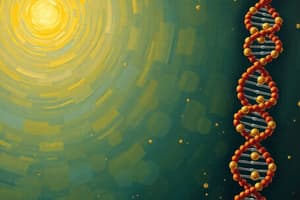Podcast
Questions and Answers
What is a codon?
What is a codon?
- A set of three bases in tRNA that match the codon on the mRNA
- A type of protein
- A three base sequence on the mRNA that codes for a specific amino acid (correct)
- A nucleotide sequence in DNA
What is an anticodon?
What is an anticodon?
- A three base sequence on the mRNA
- A set of three bases in tRNA that match the codon on the mRNA (correct)
- A type of enzyme
- None of the above
List the three ways RNA is different from DNA.
List the three ways RNA is different from DNA.
- Ribose sugar, DNA has deoxyribose sugar. 2. RNA is a single strand and DNA is a double strand. 3. Uracil pairs with adenine, in DNA thymine pairs with adenine.
What is the role of mRNA in protein synthesis?
What is the role of mRNA in protein synthesis?
What role do codons and anticodons play in heredity?
What role do codons and anticodons play in heredity?
What is the role of tRNA in protein synthesis?
What is the role of tRNA in protein synthesis?
How is transcription different from translation?
How is transcription different from translation?
The sequence of amino acids in a protein is determined by information carried in what molecule?
The sequence of amino acids in a protein is determined by information carried in what molecule?
How many amino acids are coded for in the following DNA strand: ATTAGCCAGATTACA?
How many amino acids are coded for in the following DNA strand: ATTAGCCAGATTACA?
What would the complementary strand of DNA be for the nucleotide sequence ATTAGCCAGATTACA?
What would the complementary strand of DNA be for the nucleotide sequence ATTAGCCAGATTACA?
What would the RNA strand look like if it were transcribed from the DNA sequence ATTAGCCAGATTACA?
What would the RNA strand look like if it were transcribed from the DNA sequence ATTAGCCAGATTACA?
Where do the amino acids that tRNA molecules pick up in the cytoplasm come from?
Where do the amino acids that tRNA molecules pick up in the cytoplasm come from?
Where do ATP used in protein synthesis come from?
Where do ATP used in protein synthesis come from?
Describe the flow of information for making a protein from the nucleus to the actual protein.
Describe the flow of information for making a protein from the nucleus to the actual protein.
Write a paragraph to describe the process of protein synthesis beginning in the nucleus and ending with a complete protein.
Write a paragraph to describe the process of protein synthesis beginning in the nucleus and ending with a complete protein.
Flashcards are hidden until you start studying
Study Notes
Protein Synthesis Overview
- Codon: A three-base sequence on mRNA that codes for a specific amino acid.
- Anticodon: A trio of bases in tRNA that correspond to the codon on mRNA.
Key Differences Between RNA and DNA
- Sugar Type: RNA contains ribose while DNA contains deoxyribose.
- Strand Structure: RNA is single-stranded; DNA is double-stranded.
- Base Pairing: In RNA, uracil pairs with adenine; in DNA, thymine pairs with adenine.
Role of mRNA
- Function: Acts as messenger RNA, transporting genetic instructions from DNA in the nucleus to the ribosome in the cytoplasm.
Importance of Codons and Anticodons
- Codons: Three-nucleotide sequences identifying unique amino acids.
- Anticodons: Complementary sequences in tRNA that ensure the delivery of the correct amino acid, facilitating proper protein assembly, which influences traits.
Role of tRNA
- Function: Transfers amino acids and matches anticodons to corresponding mRNA codons, ensuring timely and accurate delivery of amino acids to the ribosome.
Transcription vs. Translation
- Transcription: The process of creating a temporary mRNA copy of a gene from DNA.
- Translation: The conversion of mRNA instructions into a chain of amino acids, resulting in protein formation.
Amino Acid Determination
- The sequence of amino acids in a protein is dictated by information stored in DNA.
DNA and RNA Sequences
- Amino Acids from DNA Sequence: From the DNA strand ATTAGCCAGATTACA, five amino acids are coded.
- Complementary DNA Strand: For the sequence ATTAGCCAGATTACA, the complementary strand is TAATCGGTCTAATGT.
- Transcribed RNA Strand: The RNA strand transcribed from DNA sequence ATTAGCCAGATTACA is UAAUCGGUCUAAUGU.
Source of Amino Acids
- Amino acids in the cytoplasm come from food consumed.
ATP in Protein Synthesis
- ATP is utilized to form peptide bonds between amino acids during protein synthesis.
Flow of Information in Protein Synthesis
- The process flows from DNA to mRNA, then to tRNA, followed by amino acids, culminating in the formation of the final protein.
Studying That Suits You
Use AI to generate personalized quizzes and flashcards to suit your learning preferences.




